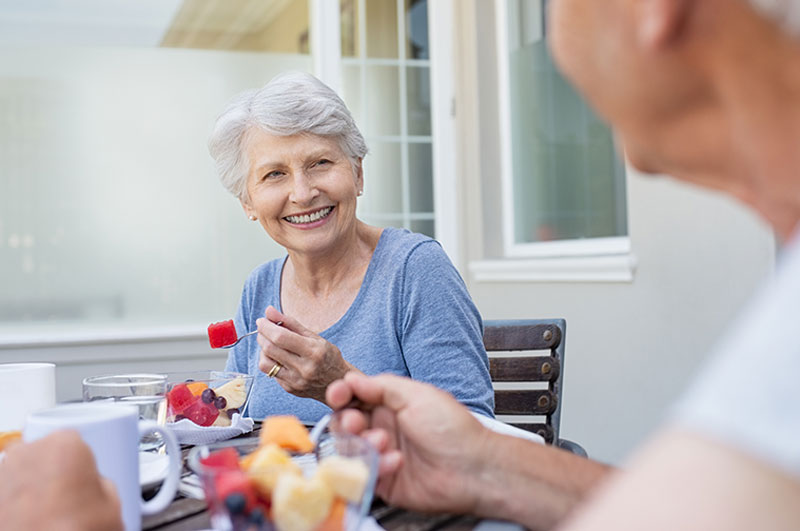
The benefits of fiber are numerous and can help benefit long-term health for older adults.
If a senior loved one in your life is more inclined to indulge in the various junk and fast food choices which are so readily accessible, they are in excellent company. While these sorts of foods are convenient, they are usually full of calories, cholesterol and fat and lack fiber as well as other key nutrients that are essential to nourish aging bodies. As a matter of fact, as few as 5% of us are consuming enough fiber – something extremely important for older adults.
Reasons Why Fiber Is Important
The benefits of fiber include:
- Weight control: Lower in calories and slower to digest, foods that are typically abundant in fiber help us to feel fuller longer.
- Reduced cholesterol: With fiber in the digestive tract, your body absorbs lower levels of cholesterol.
- Blood sugar regularity: Because high-fiber foods take more time to be digested, more consistent blood sugar levels are sustained.
- Improved gastrointestinal tract functioning: Fiber in the digestive tract stimulates the intestines, reducing problems from constipation.
- Lower cancer risk: Adequate amounts of fiber in the diet help protect against certain types of cancer, including colon cancer.
How to Boost Fiber Intake
If an older adult’s diet has been deficient in sufficient levels of fiber, it’s important to add more fiber slowly and gradually. Adding too much fiber all at once can cause bloating, gas, and other adverse reactions. Encourage seniors to increase fiber intake over a few days, while making sure to consume lots of water as well, which can help reduce unwanted symptoms.
These foods with a high fiber content are a great place to start. Keep in mind that it is recommended that adults should be consuming 14 grams of fiber for every 1,000 calories consumed each day, which equates to about 24 grams for females and 38 grams for men.
- Apples (4.4 grams in one single raw, average-sized apple)
- Raspberries (6.5 grams per cup)
- Pears (5.5 grams in one single raw, medium-sized pear)
- Strawberries (3 grams per cup)
- Avocado (10 grams per cup)
- Bananas (3.1 grams in one single medium-sized banana)
- Carrots (3.6 grams per cup)
- Broccoli (2.4 grams per cup)
- Beets (3.8 grams per cup)
- Brussels sprouts (3.3 grams per cup)
- Artichoke (6.9 grams in a single raw globe)
- Kidney beans (12.2 grams per cup, cooked)
- Lentils (13.1 grams per cup, cooked)
- Chickpeas (12.5 grams per cup, cooked)
- Split peas (16.3 grams per cup, cooked)
- Oats (16.5 grams per cup, raw)
- Popcorn (1.15 grams per cup, popped)
- Quinoa (5.2 grams per cup, cooked)
- Almonds (4 grams per 3 tablespoons)
- Sweet potatoes (3.8 grams per medium-sized boiled potato without skin)
- Dark chocolate (3.1 grams per 1-ounce piece)
With a multitude of options to suit each older adult’s particular taste, it’s not difficult to add more fiber to the diet and improve senior health.
At Anthem Home Care, providers of award-winning long term care in Portland, TX, we understand how a well-balanced diet for older adults helps safeguard overall health and wellness so that they can continue to live engaged and active lives. Our knowledgeable care team is here to help encourage healthy snacking and eating habits for older adults and provide companionship during meals, and any other time, day or night. Our care team can also grocery shop, plan and prepare healthy and balanced meals and snacks that are customized to specific dietary restrictions or needs, and even tidy up the kitchen afterwards.
To learn all about the many ways the Anthem Home Care’s team is available to help an older adult you love maintain nutritious eating habits and so much more, contact us at 361-643-2323 to schedule a complimentary in-home consultation. For a full list of the communities we serve, please visit our Service Area page.
Anthem Home Care is licensed by the Texas Department of Aging and Disability (License # 019251).
